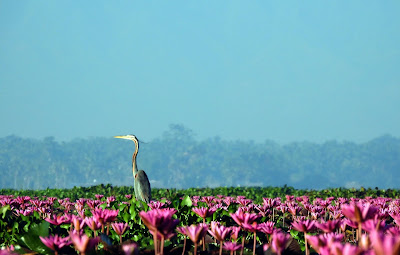The
Liguasan Marsh trip last February 8-10 was truly a pleasant surprise. At first
I was hesitant to join what with my wifey again having a negative stance of the
destination. Yes, Liguasan Marsh was a haven of terrorists before but the process
of transformation has just started to make this place a tourist attraction
especially for naturalists. A special kind of salutation is due to the 33rd
Infantry Batallion of the Philippine Army for always in the forefront of
employing a community-based peace and development mechanism. Hats off to its
Batallion Commander Col. Harold Cabunoc.
Liguasan
is indeed a paradise. Barring all the high magnitude of negative image built
about the place and other surrounding environment this could have been a high
end tourism product already. Liguasan is one of the two major marshes in
Mindanao that serve as a water bed to several localities such as Sultan
Kudarat, Maguindanao and Cotabato provinces. In it are valuable resources like
inland fishes and birds. It also fertilizes adjacent farmlands by the huge
water it transported to agricultural production areas either through manual
irrigation or underground water supplementation. And lately it has been
considered that Liguasan Marsh has vast deposit of oil. All these are
potentials that could really convert its host LGUs into rich towns if properly
manage maximize.
Meanwhile,
our birding trip in Liguasan was organized by the 33rd IB, hoping
that somehow Bird Watching could become a good strategy for tourists to visit
the site soon. We started the navigation through the marshland by 6:00 in the
morning as we still had to attend to a community immersion in barangay
Midpandacan, the last community composed mainly of Maguindanaons. Some of them
even members of the Bangsamoro Islamic Freedom Fighters (BIFF) who are now
serving the community as guides and boatmen.
Right
at the docking point we already saw some familiar waders such as egrets and
herons but this time not very clear yet as to the specific specie because it
was still dark by 6 AM. I spotted a type of Warbler in a grassland portion, but
the most that I could identify was the White-browed Crake wading through the
large portion of water hyacinths. The average-sized motorized boats were our
transportation mode, the easiest mode by far to go through water lily routes in
the marsh. Along the way there were plenty of Purple Herons, Grey Herons and
Javan Pond Herons.
I
suggested to our boatman to look for shallow portion so we could have good
ground stability while taking bird photos. So we stopped by a certain site
filled with greater numbers of Purple Swamphen. On the way further we saw some
Comb-crested Jacana, the one considered by expert birders to have been last
cited in 1973. This bird has a very attractive color and a lifer to me and some
other guests. It is good to have it recorded once again after terrorism
prevented birders for seeing them. Although a resident bird, the Comb-crested
Jacana can only be seen in Liguasan Marsh and Lake Buluan, all in the province
of Maguindanao and Tacurong City.
Other
common birds I personally observed in the marsh are Philippine Duck, Whiskered
Terns, the rare Spotted Whistling Duck and Black-winged Stilt. A special Black-winged
Kite raptor was also seen in the tree canopy of Midpandacan barangay proper.
After
our birding session we were invited by Col. Cabunoc to witness a Rido
Settlement ceremony, a conflict-resolution mechanism for two clans who have
been into war for more or less two decades. With the geographic characteristic
of the locality and the traditions of its inhabitants rido is still a thing
here, I mean they still resort to it whenever miscommunication and misunderstanding
happen against each clan. With the able leadership of the 33rd IB
the rido finally came to end.




























No comments:
Post a Comment